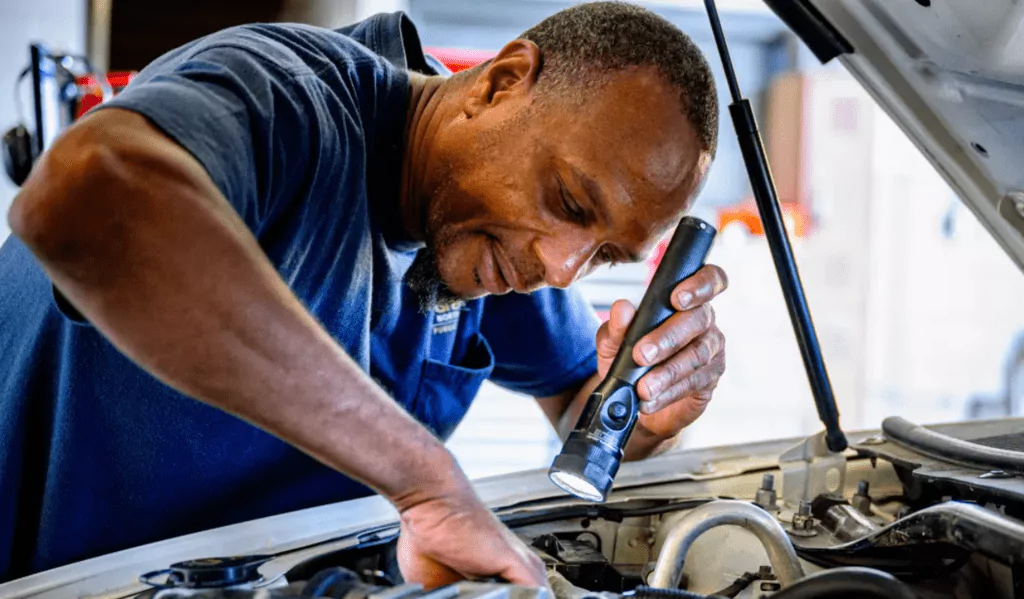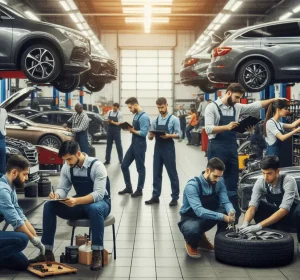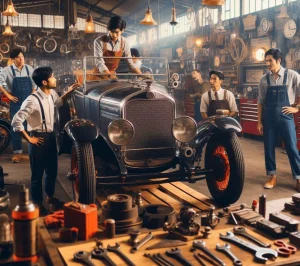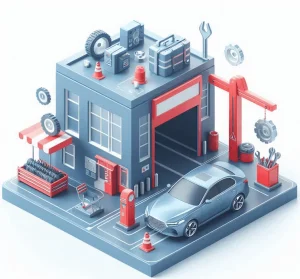Table of Contents
Discover the secrets to effortless car maintenance and enjoy safe, stress-free drives. Learn expert tips to save money while keeping your vehicle in top-notch condition.

Car Maintenance is more than just an obligatory chore—it’s a smart investment that can save you money, ensure your safety, and prolong the life of your vehicle. In this comprehensive guide to car maintenance, we’ll delve into the world of automotive care, providing you with expert insights, practical tips, and a roadmap to keep your car running smoothly.
Imagine having a car that purrs like a contented cat every time you turn the key in the ignition, effortlessly gliding down the road. That’s the magic of effective car maintenance. Whether you’re a seasoned car enthusiast or a novice driver, this guide is your gateway to becoming a proficient car caretaker.
In the following sections, we’ll explore why regular car maintenance is not only crucial but also rewarding. We’ll discuss the tangible benefits it offers, including a longer vehicle lifespan, improved safety, cost savings, enhanced fuel efficiency, and the preservation of your car’s resale value.
But this guide doesn’t stop at theoretical knowledge. We’ll take you by the hand through practical steps, detailing the essential tasks you need to perform regularly to ensure your car’s well-being. From oil changes to tire care, brake inspections to battery maintenance, we’ve got you covered.
We’ll also help you navigate the decision of when to roll up your sleeves and tackle maintenance tasks yourself and when it’s wiser to entrust your car to the capable hands of professional mechanics. By the end of this guide, you’ll not only understand the importance of car maintenance but also feel empowered to take action and care for your vehicle like a pro.
So, if you’re ready to embark on a journey that will make you a more informed and responsible car owner, let’s dive into the world of car maintenance together. Get ready to discover the secrets that will keep your car in peak condition, ensuring safe, smooth, and budget-friendly drives for years to come.
The Importance of Regular Car Maintenance
Imagine your car as a loyal companion on life’s journey, always ready to take you wherever you want to go. Just like any companion, it deserves your care and attention. Regular car maintenance is the key to ensuring that your vehicle remains dependable, safe, and efficient throughout its lifespan. In this section, we’ll delve deeper into why regular car maintenance should be a top priority for every car owner.
Prolongs Vehicle Lifespan: Your car is a significant investment, and you want it to last as long as possible. Regular maintenance is like a fountain of youth for your vehicle. It helps your car age gracefully, reducing wear and tear, and preventing premature breakdowns. By following manufacturer-recommended maintenance schedules, you can add years to your car’s life, saving you the hassle and expense of premature replacements.
Ensures Safety: Safety should always be a paramount concern when it comes to your car. Regular maintenance checks help identify and rectify potential safety hazards. For instance, routine brake inspections can catch worn brake pads before they compromise your ability to stop safely. Replacing damaged tires can prevent blowouts on the highway. And ensuring your lights and signals are in working order enhances your visibility and the safety of everyone on the road.
Saves Money: It might seem counterintuitive, but spending a little on regular maintenance can save you a lot in the long run. Small issues caught early can often be fixed inexpensively. However, if left unattended, these issues can snowball into major, costly repairs. Think of it as an investment that prevents your car from becoming a money pit.
Enhances Fuel Efficiency: We all want to save on fuel costs and reduce our carbon footprint. A well-maintained car is a more fuel-efficient car. Simple tasks like changing the oil, replacing air filters, and keeping your tires properly inflated can significantly improve your mileage. Over time, these small changes translate into big savings at the pump.
Car Maintenance Resale Value: Even if you don’t plan to keep your car forever, regular maintenance is essential. A well-documented maintenance history enhances your car’s resale value. Potential buyers are more inclined to pay a premium for a vehicle that has been well cared for. So, when the time comes to upgrade or sell, your investment in maintenance will pay off.
In summary, regular car maintenance is not just a chore; it’s a wise investment in the longevity, safety, and performance of your vehicle. By following recommended maintenance schedules and addressing issues promptly, you’ll enjoy the peace of mind that comes with knowing your car is in top-notch condition. So, make it a habit to care for your car, and it will reward you with many years of reliable service.
Getting Started with Car Maintenance
Now that you understand the importance of regular car maintenance, let’s roll up our sleeves and delve into the practical steps you can take to ensure your vehicle remains in top-notch condition. Whether you’re a do-it-yourself enthusiast or prefer leaving it to the professionals, this section will provide you with a roadmap to get started on the journey of car maintenance.
Car Maintenance Checklist
A car maintenance checklist is your best friend when it comes to keeping track of what needs to be done and when. Here’s a breakdown of essential tasks that should be on your checklist:
- Oil Change: The lifeblood of your engine, oil needs to be changed regularly to keep your engine running smoothly. Consult your car’s manual for the recommended interval, which typically ranges from every 3,000 to 5,000 miles.
- Tire Care: Your tires are the only part of your car that makes direct contact with the road. Check tire pressure regularly and adhere to your car manufacturer’s recommended pressure levels. Additionally, rotate your tires every 6,000 to 8,000 miles to ensure even wear and extend tire life.
- Brake Inspection: Your brakes are crucial for your safety. Have them inspected at least once a year or as recommended by your car manufacturer. Look out for signs of worn brake pads or rotors, such as squeaking or reduced braking performance.
- Fluid Levels: Your car relies on various fluids, including coolant, transmission fluid, brake fluid, and windshield washer fluid. Regularly check these fluid levels and top them up as needed to ensure optimal performance.
- Air Filter Replacement: A clean air filter is essential for your engine’s efficiency. Replace it every 12,000 to 15,000 miles or as recommended in your car’s manual.
- Battery Maintenance: Clean the battery terminals to prevent corrosion and ensure a secure electrical connection. If your battery is older than 3-5 years, consider replacing it preventatively to avoid unexpected breakdowns.
- Lights and Signals: Regularly check all your car’s lights, including headlights, taillights, brake lights, and turn signals. Replace any burnt-out bulbs promptly to maintain visibility on the road.
- Suspension and Alignment: If you notice that your car pulls to one side while driving or if the steering wheel vibrates, it’s time to have your suspension system inspected. Additionally, a wheel alignment can correct issues with your car’s handling and tire wear.
DIY vs. Professional Maintenance
Deciding whether to tackle maintenance tasks yourself or seek professional help can be a daunting choice. Here’s a general guideline to help you make informed decisions:
- DIY Maintenance: Basic tasks like oil changes, tire rotations, air filter replacements, and minor electrical repairs can often be handled by car owners with some mechanical knowledge and the right tools. There are plenty of resources available online, including tutorials and guides, to assist you in these endeavors.
- Professional Maintenance: When it comes to brake repairs, engine diagnostics, transmission problems, and significant electrical issues, it’s usually best to leave it to certified mechanics. They have the expertise, experience, and equipment necessary to tackle complex issues and ensure your car’s safety and performance.
Remember that safety should always be a priority. If you’re uncertain about your ability to perform a particular maintenance task, it’s safer to seek professional assistance. Ultimately, a well-maintained car, whether you handle some tasks yourself or rely on professionals, is a car that will serve you well for years to come.
FAQs (Frequently Asked Questions)
We understand that car maintenance can be a complex and sometimes intimidating topic. To help demystify the process and address common concerns, we’ve compiled a list of frequently asked questions (FAQs) along with clear, concise answers. Whether you’re a novice or an experienced car owner, these FAQs will provide you with valuable insights into the world of car maintenance.
Q: How often should I change my car’s oil? A: The frequency of oil changes depends on several factors, including your car’s make and model, the type of oil used, and your driving habits. As a general rule of thumb, it’s recommended to change your car’s oil every 3,000 to 5,000 miles. However, modern vehicles and synthetic oils may allow for longer intervals. To be sure, consult your owner’s manual for specific guidelines tailored to your car.
Q: Can I use any type of oil for my car? A: No, it’s crucial to use the type of oil recommended in your owner’s manual. Different engines require specific oil formulations to operate optimally. Using the wrong oil can lead to reduced performance, increased wear and tear, and potential engine damage. Always adhere to the manufacturer’s recommendations.
Q: When should I replace my car’s timing belt? A: The timing belt is a critical component that synchronizes the rotation of the engine’s crankshaft and camshaft. It should be replaced at regular intervals, typically every 60,000 to 100,000 miles. However, specific recommendations may vary by car make and model, so consult your owner’s manual for precise timing belt replacement intervals. Ignoring this maintenance can lead to severe engine damage if the timing belt fails.
Q: What are the signs of a failing battery? A: A failing battery can manifest in several ways. Common signs include:
- Difficulty starting the car, with the engine turning over slowly
- Dimming headlights or interior lights when starting the car or using electrical accessories
- Dashboard warning lights, such as the battery or check engine light If you notice any of these signs, it’s advisable to have your battery inspected and possibly replaced.
Q: How often should I have my brakes checked? A: Brake inspections are crucial for your safety. It’s recommended to have your brakes inspected at least once a year or as often as your car manufacturer suggests in your owner’s manual. Additionally, pay attention to any unusual noises, such as squeaking or grinding, and address them promptly. Neglecting brake issues can lead to more extensive and costly repairs.
Q: Can I ignore a check engine light if my car seems fine? A: No, you should never ignore a check engine light. This warning light indicates that your car’s onboard computer has detected a potential issue with the engine, emissions system, or other critical components. Even if your car appears to be running smoothly, the check engine light signifies a problem that requires attention. Ignoring it can lead to more extensive and expensive repairs down the road. It’s best to have the issue diagnosed and resolved promptly.
These FAQs provide valuable guidance on some of the most common concerns related to car maintenance. Remember that proactive and informed car care is the key to ensuring your vehicle’s longevity, safety, and performance. If you have additional questions or face specific maintenance challenges, don’t hesitate to seek advice from professionals or automotive experts.





More Stories
Powerful Secrets Every Cars Mechanic Knows for a Smoother, Happier Drive
Transform Your Ride: Discover the Joy of Automotive Refinishing Mastery
Celebrate Automotive Beauty: Proven Auto Restoration Parts for Brilliant Results